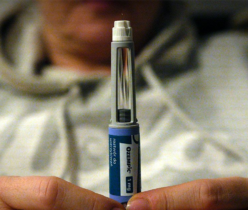The results of the first human trial examining a new weight loss procedure called gastric mucosal ablation were released Thursday, and the non-surgical procedure caused minimal side effects with a short outpatient recovery period compared to other weight loss procedures, though the amount of weight lost was less.
3D illustration of a folder with focus on a tabs with the texts bariatric surgery, gastric bypass … [+]
The researchers followed 10 female participants with an average age of 38.4 years, and average BMI of 40.2 (obesity is defined as a BMI of 30 or above) over a six-month period between November 2022 and April 2023.
Each participant underwent the endoscopic procedure called gastric mucosal ablation, which involves inserting a fluid cushion to protect the stomach lining before using a tiny device to burn the gastric fundus—the lining of the upper portion of the stomach.
The hunger hormone called ghrelin is mainly stored in the gastric fundus and the production of ghrelin leads to increased feelings of hunger, so burning the gastric fundus reduces ghrelin production, thus leading to less food consumption.
The participants lost an average of almost 8% of their body weight within six months, totaling around 19 pounds on average, decreased their ghrelin production by 45%, decreased their stomach capacity by 42% and reduced their hunger cravings and appetite by 43%.
The participants didn’t experience any severe adverse events, only minimal side effects like gas pressure, mild nausea and cramping, which lasted between one and three days, Dr. Christopher McGowan, the study’s lead author and a gastroenterologist and medical director of the medical clinic True You Weight Loss, said during a media briefing.
The procedure took an average of 55 minutes and all participants underwent it on an outpatient basis—meaning they didn’t require hospitalization afterward—so they were able to leave and go home within an hour after the procedure.
Get Forbes Breaking News Text Alerts: We’re launching text message alerts so you’ll always know the biggest stories shaping the day’s headlines. Text “Alerts” to (201) 335-0739 or sign up here.
Gastric mucosal ablation is considered a minimally invasive surgical option because it only burns the gastric fundus, while other invasive procedures like gastric sleeve and bypass involve removing or bypassing the gastric fundus—making a new pouch in the stomach and connecting it to the intestines. “For patients who are fearful of surgical complications, these minimally invasive techniques may represent a more acceptable treatment option,” McGowan told Forbes.
“It could be an additional option for patients who don’t want or aren’t eligible for anti-obesity medications, such as Wegovy and Ozempic, or bariatric surgery,” McGowan said of gastric mucosal ablation in a statement.
1 billion. That’s how many people worldwide have obesity, according to recent research published in the Lancet. That includes 879 million adults and 159 million children.
One Community. Many Voices. Create a free account to share your thoughts.
Our community is about connecting people through open and thoughtful conversations. We want our readers to share their views and exchange ideas and facts in a safe space.
In order to do so, please follow the posting rules in our site’s Terms of Service. We’ve summarized some of those key rules below. Simply put, keep it civil.
Your post will be rejected if we notice that it seems to contain:
User accounts will be blocked if we notice or believe that users are engaged in:
So, how can you be a power user?
Thanks for reading our community guidelines. Please read the full list of posting rules found in our site’s Terms of Service.


